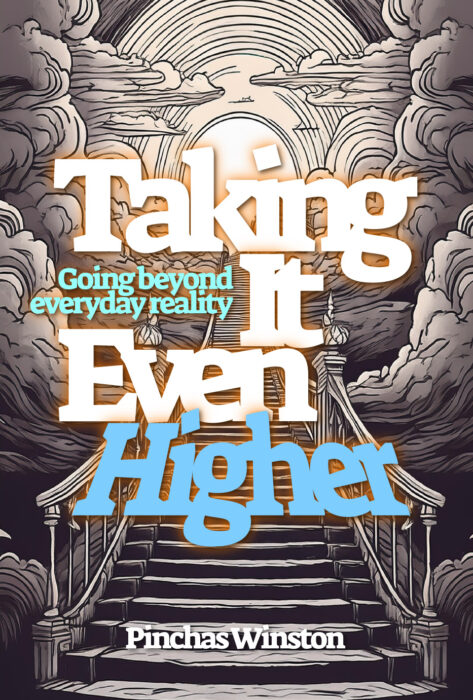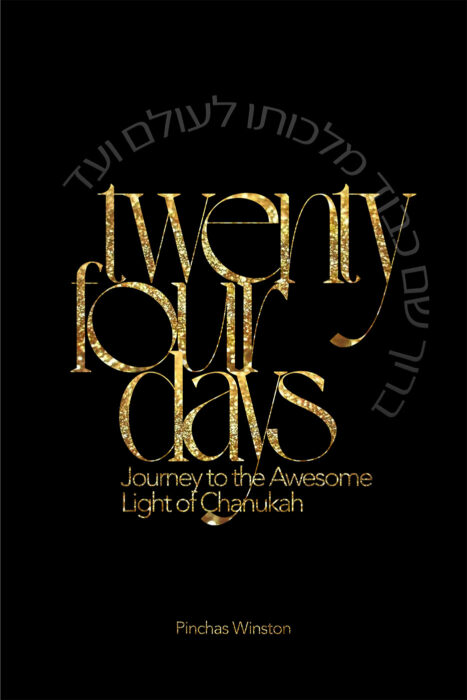Parashas Lech-Lecha, Issue #1070 – By Rabbi Pinchas Winston
Friday Night
IT USED TO be important to me to make Torah and science square with each other. When you are involved in outreach, the issue often comes up because many secular people treat science like it is absolute truth. If they see a contradiction between Torah and science, they assume the Torah is wrong, having been written long before science had come to know so much about how the world works.
Of course, that doesn’t make a difference if God authored the Torah, a fundamental of Torah belief. He made the world, He made science, and nothing man can ever discover or work out can exist outside His knowledge base, which is infinite. He is all knowledge, and He knew everything science would ever come up with at the time He gave the Torah to the Jewish people in 1313 BCE. A secular person however does not yet believe this, and this has forced outreach professionals to make Torah jive with science.
Science has a blinding advantage. It deals with the here and now, a world of which we are part and can participate in. The Torah, on the other hand, deals with ancient history and includes many events that we have not witnessed, making them hard to believe. I certainly felt a slight boost in my emunah when I read in Josephus that the pillar of salt that Lot’s wife became was still visible in his time. It was kind of scientific verification of a biblical event.
The ironic thing is that the modern world’s advantage is also its shortcoming. When it gets something right, and that is not always the case, it is only dealing with the present. The only way it can apply its knowledge of the present to the past is by making the huge assumption that everything back then was more or less the way it is today. It has to assume that the rules haven’t changed much, and we’re just discovering today what has always been.
But is it? Even the world of science on occasion has found reason to question this, especially since the Dark Ages shut down technological advancement for about 500 years. The modern secular world today, for the most part, was born in the 1500s during the Renaissance Period. Until 500 years ago, mankind groped in intellectual darkness, more than enough time to lost track of what came before.
Then there is the God factor again. He runs the world and He directs history, sometimes overtly, mostly covertly. He decides what man can know, controlling the flow of knowledge in every generation. It’s easy to write God out of history. It’s just not accurate to do so, because leaving Him explains so much about the path of mankind over the ages. Just because a person can’t see how, or worse, doesn’t want to see how, does not mean that God isn’t pulling all the strings.
At the end of the day, this is what made Avraham who he was. This is what separated him from the rest of the world around him. While the rest of his world was only interested in coping with the reality in which they found themselves, and looking for ways to use it to their material benefit, Avraham was only interested in truth, the truth, God’s truth.
Shabbos Day
THE MOTHER SUDDENLY realized that she might have undercooked. She worried that she had more guests than food, and to avoid an embarrassing situation she told her children, “When I offer the chicken, say you’re already full and you don’t want any, okay?” The children happily agreed because normally, they could not get out of having the main course. They did as they were told and has hoped there was just enough food for the guests. Everyone was happy except, that is, when the mother came out with the dessert and said, “Anyone who did not have chicken can’t have dessert!”
It is called making aliyah—ascending. Israel may not be the highest land geographically, but it is spiritually, so no matter which land you come from, it is always called making aliyah. Someone wanted to say that that just as receiving an aliyah on Torah reading days is by invitation only, likewise you have to be invited by Heaven to make aliyah to Eretz Yisroel. This is what God did when He told Avraham, “Lech-Lecha…”
There are still many people who do not mind not being “invited” to Eretz Yisroel. For many, the reasons for not going are really just excuses because, quite frankly, they don’t want to go. Even burdens that keep them pinned down in the Diaspora are acceptable because they consider it to be a bigger burden to make aliyah. Whatever merit there might be for living there, they believe, can be offset by the merit of what they are doing while living in the Diaspora.
Until it comes time for “dessert.” That’s when God will reveal to all of us, those who made aliyah and those who did not, the benefit of having done so before Moshiach comes. That’s when God will say, “Anyone who did not make aliyah (or at least consider it) before Moshiach came can’t have ‘dessert’,” meaning all of the benefits that will follow after the “main course,” history as we know it now, will finally end.
Because as the Gemora says, God works measure for measure (Sanhedrin 90a). You get what you pay for with Torah, mitzvos, and above all, mesiras Nefesh—self-sacrifice. That’s why right after God tells Avraham to make aliyah, He also promises him children, fame, and money. These are things, Rashi explains, that traveling can deny a person. The same will be true for those who made aliyah while it was still a choice, and those who did not.
Thus the Midrash says that after Moshiach comes and rights the world, all remaining Diaspora Jews will willingly come to Eretz Yisroel and be astounded by the level of the Jews already living there. They won’t just say, “Oh well, we’ll just have to do with less, a small price to pay for having been able to live in the Diaspora until the end.” They will instead bitterly complain to Moshiach about the inequality. It will be too little to late.
Skeptical? They’re only midrashim?
A little skepticism is a good thing, they say. Too much can kill you. And then there is what you might call uninformed skepticism, the kind that rises from not knowing enough and thinking that you do. It is amazing how quickly a few facts can make believers out of skeptics, and turn lives completely around.
For example, it says in this week’s parsha:
The valley of Siddim had many clay pits, and the kings of Sdom and Amorrah fled and they fell there, and the survivors fled to a mountain. (Bereishis 14:10)
There were many pits there from which they took earth for the clay for building. The midrashic explanation is that the clay was kneaded in them [i.e., in the pits], and a miracle occurred for the king of Sdom that he escaped from there because some of the nations did not believe that Avraham had been saved from from the fiery furnace in Ur Kasdim. Since this one escaped from the clay, they believed in Avraham retroactively. (Rashi)
That’s the human condition ever since we absorbed the yetzer hara into our being. It makes mountains out of molehills and vice-versa (Succah 52). It takes a real chacham, the Gemora says, to be able to project into the future (Tamid 32a), not just intellectually but emotionally as well.
I remember seeing a comic strip many years back. A young genius boy is building a sophisticated house of cards. His slightly older and bully of a sister comes over and menacingly asks him, “What would you do if I destroyed your house of cards?” But without looking the least bit concerned, he casually answers her, “Nothing for now. But when you and your future husband will later ask me to cosign on a mortgage, I won’t do it.” Needless to say his sister does nothing and just walks away.
For now, people feel no loss living away from Eretz Yisroel. Later they will feel just the opposite. Fortunate is the person who can correctly come to terms with the future, in the present.
Seudas Shlishis
SPEAKING OF GETTING what you pay for, it works the same way for getting married and building a family.
Last week’s parsha made a point of telling us that Sarah was barren. This week’s parsha tells us that God promised Avraham children, but that didn’t happen for years after. The promise came to Avraham when he was 70, but he didn’t have Yitzchak until he was 100, just after he questioned God about it:
Avram said, “God, what will You give me, since I am going childless, and the steward of my household is Eliezer of Damascus?” Avram said, “You have given me no seed, and behold, one of my household will inherit me.” (Bereishis 15:2-3)
I often quote the Leshem, but there is an amazing story about him. Being the great mekubel and tzaddik that he was, people came from all over to receive a brochah from him, particularly when they were having difficultly having children. One day his own daughter came to him and said, “You are giving your brochah to all of these families to have children, and I still have none. Give me your brochah too!” He told her, “Not only will you have a son, but what a son you will have!”
And the Leshem was right. Her son grew up to be one of the greatest rabbis of his generation, Rabbi Yosef Shalom Elyashiv, zt”l. And even though his last name was not Elyashiv, he took it on in deference to his grandfather. The only question is, why did she wait so long to ask for her father’s brochah, and why did it take so long for her to have a son?
The son himself was the answer. Rabbi Yosef Shalom Elyashiv, zt”l, was destined to be a Gadol HaDor, and for that to happen, the spiritual circumstances had to be right. Every day we change, some for the better, some for the worse. And since God works measure for measure, changing for the better brings “better” hashgochah, and the opposite is true as well. To give birth to a Yosef Shalom Elyashiv, his father and mother had to be spiritually just so…the world had to be just so. When it was, God set in motion the events that would make her ask for the brochah right when she did, which played a part in the process as well.
The same thing was even truer about Yitzchak. Not only was Yitzchak destined to be a Gadol HaDor, he was destined to a forefather, an extraordinary thing to be born. A Yishmael could be born about any time, but a Yitzchak could only be born when the world could support such a great individual. The 29 years between blessing and birth were directed by God specifically to make that happen.
As the Gemora teaches, anyone who forces a moment will end up being pushed off by the moment, that is, they won’t succeed. But anyone who allows the moment to push them off will see the moment pushed off for them (Brochos 64a). As Shlomo HaMelech wrote in Koheles, everything has its moment, and it might not always be the one we choose. It usually isn’t. When it comes to emunah, patience is more than just a virtue.
Ain Od Milvado, Part 24
EVERYONE KNOWS THAT lying is bad. It might be easy to do, or to rationalize, but we know it is the wrong thing to do. Lying distorts reality, or at least the perception of it, and we even have a mitzvah to distance ourselves from it.
On the other hand, we are told, lying might be the higher truth in some situations. There are times when you can lie to save your life, or even just your marriage. But not, according to the Torah, when you have done something for which you should take responsibility and suffer the consequences. If a person lies to escape that, the Torah warns, God will find a way to get the truth out anyhow. The consequences have often been worse than if the person had admitted the truth from the start.
Part of the problem with lying is that it is a violation of ain od Milvado. We lie because we are afraid of the consequences of telling the truth, as Avraham said in this week’s parsha:
Now it came to pass when he drew near to come to Egypt, that he said to Sarai his wife, “Now I know that you are a beautiful woman. When the Egyptians see you they will say, ‘This is his wife,’ and they will kill me and let you live. Please say [that] you are my sister, in order that it go well with me because of you, and that my soul may live because of you.” (Bereishis 12:9-13)
God had saved Avraham from the fires of Ur Kasdim. Could God not have saved him from Pharaoh too? Where did his trust in God go? Why did he think Pharaoh had the power to kill him if God didn’t want him dead? What was the difference now, especially since Ur Kasdim was before God spoke to him, and this was after?
The difference was that in Ur Kasdim it was only Avraham, and it only required a one-person miracle. Now the situation included Avraham, Sarai, Lot, and the rest of their entourage, and that meant a multi-person miracle. Each person added to the story added an additional mazel and impacted the overall divine providence equation. The rule is, you can decide to trust in God to save you from danger, but you can’t make others do the same, at least to the same extent, if they don’t will it for themselves.
But rather than blame others for the situation, Avraham took the blame himself. He made it seem that he was concerned for his own welfare, telling Sarah, “in order that it go well with me because of you, and that my soul may live because of you.” Some fault Avraham for this anyhow, but as far as the Torah seems concerned, he had acted in a fitting manner.
Rabbi Pinchas Winston
Thirtysix.org



















